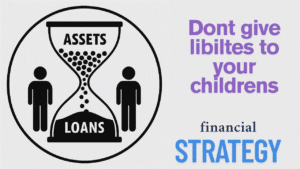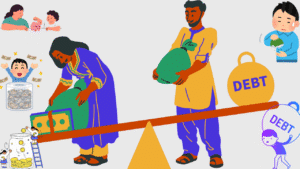Don’t Share Debts with Your Heirs – Leave Assets, Not Burdens

As parents, we often dream of leaving something valuable for our children. We imagine them proudly saying, “This is my father’s house,” or “This is my father’s car.” But what if, instead, they end up saying, “This is my father’s unpaid car loan,” or “This is my father’s personal loan that I’m now forced to repay”?
That’s not the legacy we want to leave behind.
Regardless of whether we are present or not, our debts are our responsibility. It’s essential that we plan ahead and ensure that any financial liabilities are taken care of without burdening the next generation.
A Middle-Class Man’s Wake-Up Call
Rambabu, a middle-class employee living in a rented flat in Vanasthalipuram and working at an office in Banjara Hills, never believed in taking loans. Despite not owning property, he always felt confident about managing life within his means.
One day, he received news of his father’s passing. He rushed to his hometown with his wife and children, performed the last rites over ten days, and prepared to return to his regular life.

Just then, two strangers arrived at his home. They claimed to be employees from a bank’s credit card department.
“Your father had a credit card from our bank. He has two years of unpaid dues. Since he’s passed away, it’s now your responsibility,” they said, casually sipping coffee.
Rambabu was stunned. He didn’t know whether to accept or reject their claim. He had no inheritance, no village property, not even siblings to share the responsibility. The emotional and financial shock hit him hard. His wife was distraught, and his mother-in-law deeply shaken.
Another Painful Tale: Venkat Rao’s Story
Venkat Rao had a similar experience. His father, a habitual gambler, vanished one day, leaving behind a trail of unpaid loans. Creditors soon arrived, banging on the door with warnings and legal notices. The pressure became so intense that Venkat suffered a heart attack.
Should children have to pay for their parents’ mistakes?
What the Law Says About Inheriting Debt
The legal responsibility of children for their parents’ debts depends on several factors:
-
If the children co-signed or guaranteed the loan, they are legally bound to repay.
-
If they are listed as co-borrowers, they are equally responsible.
-
This extends beyond sons to grandchildren and great-grandchildren in certain legal frameworks.

However, in most other cases—especially personal loans and unsecured debts like credit card dues—the heirs are not legally liable unless they voluntarily agree to take on the debt. Unfortunately, many lenders manipulate grieving families by saying things like:
“Your father’s soul won’t rest unless this debt is cleared.”
“Misfortune will follow if you don’t pay.”
Some heirs, caught in emotional turmoil, sign written statements accepting responsibility—sometimes without even realizing the long-term consequences.
For secured loans (e.g., mortgages backed by a house or land), the lender has the right to auction the asset through legal channels if the debt isn’t repaid. After settling the dues, any remaining amount from the auction is handed to the legal heirs.
But for unsecured personal loans, harassment of heirs is unethical and often illegal. Only a court of law can enforce repayment if it applies.
Interestingly, income tax arrears are canceled automatically after the payer’s death. That’s a strong precedent.
Insurance: The Shield Against Debt After Death

If we truly care about our family, we should leave behind peace—not chaos.
The best way to ensure this? Take a term life insurance policy that covers all major liabilities. Today, almost all banks offer loan cover or liability insurance equal to large loans like home loans. If the borrower passes away, the insurance amount is used to settle the debt.
This protects the family from financial distress and saves the bank from loss.
The principle is simple:
“One debt = One insurance policy.”
This approach ensures that families aren’t left in legal, emotional, or financial turmoil. If there are any remaining assets, they should serve as a safety net. But never allow your loans to become your family’s downfall.
Final Thoughts: Leave a Legacy, Not Liabilities
If you can’t repay a loan in your lifetime, at least ensure no one else has to. Selling assets to clear debts is fair. But making your wife and children homeless over a loan you didn’t clear? That’s not just irresponsible—it’s cruel.
We should all strive to leave behind memories, values, and assets—not burdens, threats, and lawsuits.
Let’s live wisely and plan responsibly. No parent who truly loves their children would ever want to see them suffer under the weight of inherited debt.
Real-Life Example: Ravi’s Lesson
Ravi, a 35-year-old software engineer from Hyderabad, was shocked when he received a legal notice just days after his father’s funeral. The bank was demanding repayment of a personal loan his father had taken—₹7 lakhs worth. There was no insurance on the loan, and the bank insisted that Ravi, as the legal heir, was now responsible.
Ravi was already paying off a home loan and managing school fees for two kids. He was emotionally shattered and financially cornered. It took him months to negotiate and legally prove that he was not a co-borrower, and that the debt had no collateral. But the stress and strain could have been avoided if his father had either insured the loan or settled it during his lifetime.
What the Law Says About Inheriting Debt

The legal responsibility of children for their parents’ debts depends on several factors:
-
If the children co-signed or guaranteed the loan, they are legally bound to repay.
-
If they are listed as co-borrowers, they are equally responsible.
-
This extends beyond sons to grandchildren and great-grandchildren in certain legal frameworks.
However, in most other cases—especially personal loans and unsecured debts like credit card dues—the heirs are not legally liable unless they voluntarily agree to take on the debt.
Debt Insurance: A Simple Solution
The best way to protect your family is through term life insurance or loan liability coverage. Most banks offer insurance linked to major loans like home or business loans. In case of death, the insurer repays the outstanding loan, not your family.
Stick to the rule:
Final Word
If you truly care about your family, ensure you’re not leaving behind a mess they’ll struggle to clean up. Leave memories, not liabilities. Your children deserve peace, not pressure.
✨ About Me
Hi! I’m Manikanta Reddy, a passionate finance enthusiast with a strong understanding of money management, personal finance, and smart investment strategies. I believe financial literacy is the foundation of a secure and stress-free life — and I’m here to share practical insights, real-life examples, and simplified advice to help you make better financial decisions.
Whether it’s choosing between paying off a loan or investing, building emergency funds, or planning for retirement — I love breaking down complex topics into easy, actionable tips that anyone can follow.
Let’s learn, grow, and build wealth — the smart way. 💰





